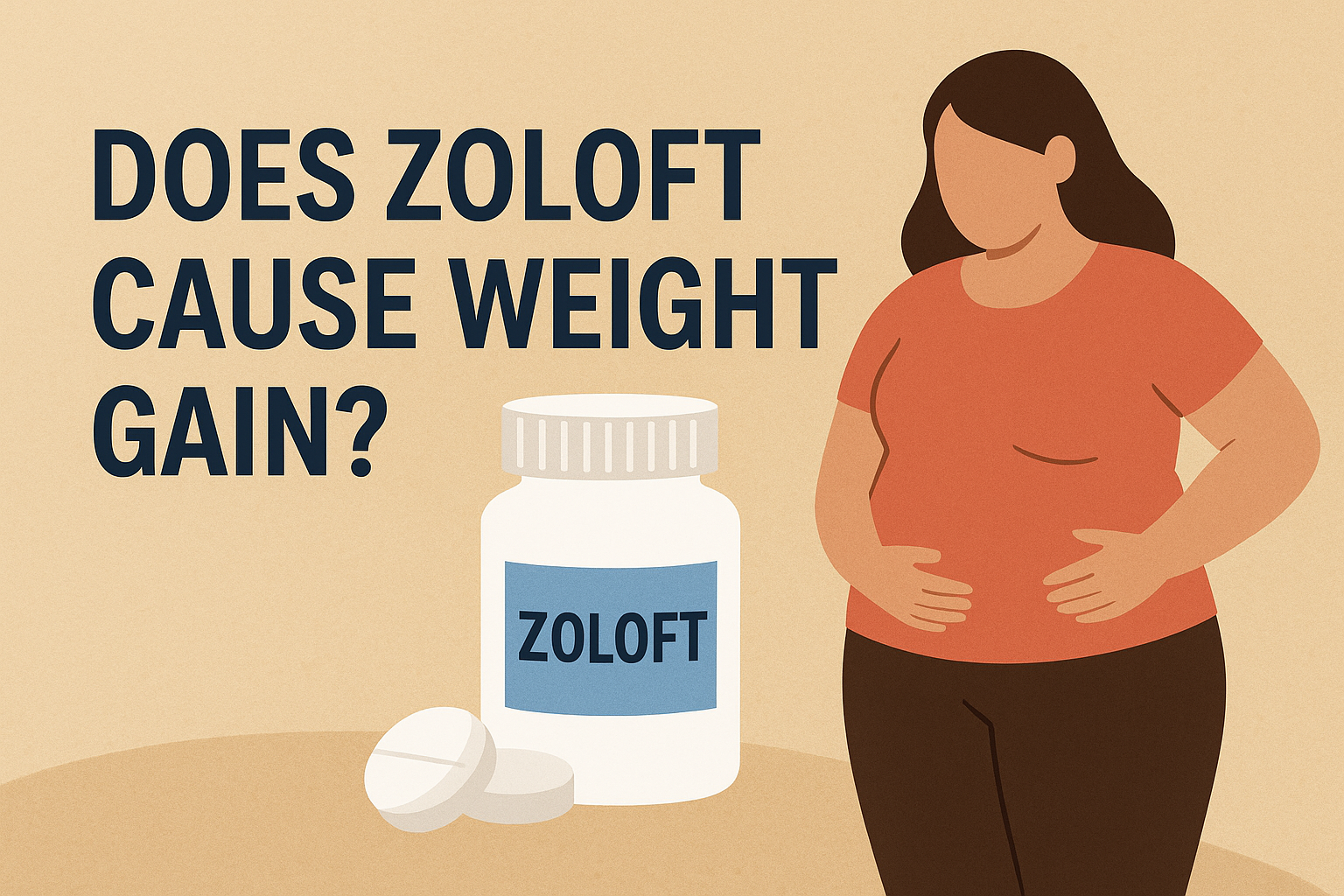Introduction
“Does Zoloft cause weight gain?” is a common concern among patients and caregivers. Zoloft (sertraline), an SSRI antidepressant, is widely prescribed for depression, anxiety, OCD, PTSD, and more. While it can be a life‐changing treatment, potential side effects—especially weight gain—often raise questions. This article aims to answer does Zoloft cause weight gain, exploring evidence, mechanisms, comparison with other antidepressants, and practical strategies to manage or minimize weight changes.
1. What the Research Says: Does Zoloft Cause Weight Gain?
Short-Term Outlook
- In clinical studies, Zoloft may even cause a slight weight loss over short durations (e.g., an average of −1.58 lb over 8 weeks), though this is not the norm .
- Many patients report no significant changes in weight during the first several months of treatment .
Long-Term Trends
- Over two years, weight gain becomes more apparent:
- One analysis found adults gained an average of 5.9 lb on Zoloft over two years .
- Another study tracked Zoloft users for up to 24 months, finding an average increase of half a pound at six months and about 3.2 lb at 24 months .
- Some sources report even higher figures—up to 10.5 lb gained over two years .
- Data shows variability—some patients may not gain weight at all, while others experience modest increases .
Summary: Zoloft is associated with modest weight gain over long-term use, though short-term weight changes tend to be minimal or mixed.
2. Why Might Zoloft Lead to Weight Gain?
While the exact mechanisms remain unclear, several plausible factors have been identified:
- Serotonin’s Role in Appetite:
SSRIs like Zoloft elevate serotonin, which regulates mood and hunger. This may increase appetite or cravings, especially for carbs . - Metabolic and Hormonal Adjustments:
Long-term SSRI use may subtly shift metabolism or disrupt appetite hormones like leptin and ghrelin . - Energy Levels and Sedation:
Zoloft can cause drowsiness, reducing activity levels and calorie burn . - Improved Mood, Restored Appetite:
Some patients regain normal appetite as their depression improves, leading to regained or excess weight . - Individual Differences:
Genetics, gender (women may be more susceptible), duration of treatment, and lifestyle all influence weight response .
3. How Does Zoloft Compare to Other Antidepressants?
Not all antidepressants are equal in terms of weight impact:
- More Likely to Cause Weight Gain:
SSRIs like Lexapro, Paxil, and SNRIs like Cymbalta tend to have higher risk than Zoloft. For example, they carry a 10%–15% higher likelihood of gaining ≥5% body weight within six months compared to Zoloft . - Less Likely or Weight-Neutral:
Wellbutrin (bupropion) shows the least weight gain risk—15% less likely to gain ≥5% body weight . - Neutral or Variable (e.g. Prozac):
Some antidepressants like fluoxetine (Prozac) show similar or slightly lower weight gain compared to Zoloft, especially in the short term .
Takeaway: Zoloft is mid-range—not the worst offender in terms of weight gain, and often preferable for those concerned about this side effect.
4. How Common Is Weight Gain on SSRIs?
Across SSRIs:
- About 11% of individuals on antidepressants gain ≥5% of their body weight in the first year .
- This risk may persist—or even accumulate—over up to six years .
That said, weight response varies, and not everyone will gain weight. Anecdotal reports and some clinicians note that weight gain is rare or minimal for many .
5. Personal Stories and Anecdotes
Reddit users report mixed experiences:
“It’s pretty rare for sertraline to cause weight gain… Odds are low.”
– Utheran
Or:
“Everything affects people differently… if you find any weight gain that’s intolerable, you could ask to stop or switch.”
– Kellogzx
These insights underscore the individual variability in response to Zoloft.
6. Tips to Manage Weight While Taking Zoloft
If you’re concerned about weight changes, here are practical strategies:
- Adopt a Healthy, Balanced Diet
Focus on fruits, vegetables, lean proteins, whole grains—and limit sugary or processed foods . - Increase Physical Activity
Even moderate exercise helps burn calories, improve mood, and counteract drowsiness . - Prioritize Good Sleep
Insufficient sleep disrupts hunger hormones, potentially increasing appetite . - Monitor Weight Regularly
Keeping tabs on your weight allows early action if you begin to see trends . - Talk to Your Healthcare Provider
If weight gain becomes significant, discuss options like dosage adjustments or switching to a more weight-friendly antidepressant like Wellbutrin (bupropion) . - Don’t Stop Medication Abruptly
Stopping suddenly can lead to discontinuation syndrome—always taper under medical guidance .
7. Final Thoughts: Does Zoloft Cause Weight Gain?
- Yes—but usually modestly: Long-term use may lead to small to moderate weight increases, but not everyone sees this.
- Variability is key: Some patients gain little or no weight; others may notice more pronounced changes.
- Lifestyle matters: Diet, activity, sleep, and stress management can significantly influence outcomes.
- Options exist: Alternatives like Wellbutrin offer potential relief if weight gain becomes problematic.
Zoloft remains a safe and effective treatment for many conditions. For those concerned about weight, proactive habits and open communication with your provider can help maintain both mental and physical well-being.
FAQs
1. Is Zoloft more likely to cause weight gain than other SSRIs?
No. Actually, SSRIs like Lexapro and Paxil often carry higher risk, while Zoloft is comparatively moderate .
2. How much weight gain is typical?
Studies place average gain at around 0.5 lb at 6 months, 3.2 lb at 2 years, with some reports up to 10.5 lb over two years—though these are not universal outcomes .
3. Why do some people gain more than others?
Factors include genetics, metabolic sensitivity, hormonal differences, lifestyle, mood improvements, and duration of use .
4. How can I minimize weight gain on Zoloft?
Eat healthily, stay active, sleep well, monitor weight, and consult your doctor if changes are significant .
5. What if I want to switch medications due to weight concerns?
Your doctor might recommend medications like bupropion (Wellbutrin), which tends to have a lower weight gain profile—and sometimes even causes mild weight loss .




